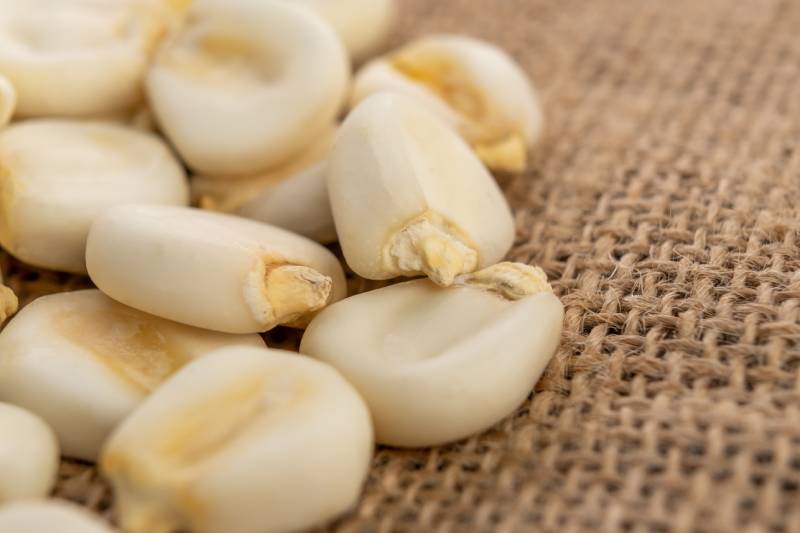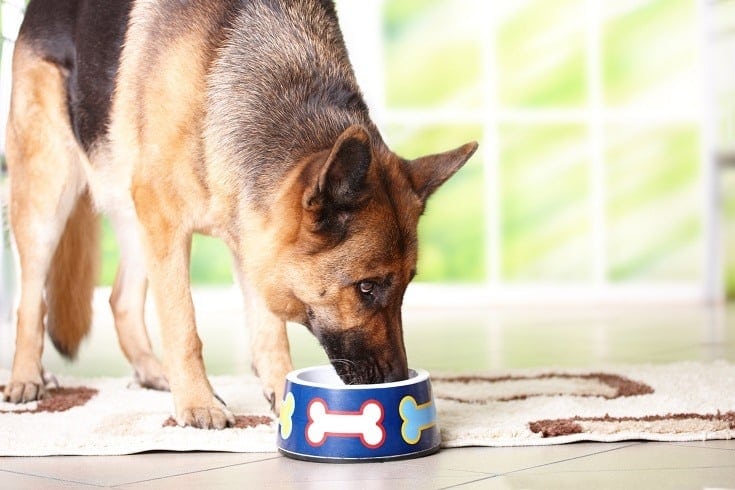Can Dogs Eat Hominy? Vet-Approved Facts & FAQ
By Brooke Bundy
Updated on

Hominy tastes a bit like chickpeas, but it’s corn that’s been processed with lime or lye and then washed to remove the hulls. As long as your dog can tolerate corn, it should have no problem ingesting hominy. Most dogs can digest grains without a problem, including corn, but there is certainly a small population that may be sensitive to grains.
More than that, dogs are omnivores. While they can (and should) eat vegetables, most of their daily calories need to come from meat for them to thrive. If you decide to feed your dog hominy, you should ensure that they receive most of their calories from a more nutritious source.
Common Objections to Corn
Corn is a controversial subject in the dog parent community. Advertising campaigns by boutique dog food brands have been touting grain-free formulas as superior to grain-inclusive recipes over the last couple of decades, instilling the idea that grain-free is healthier for your dog. Common reasons cited include perceived allergic reactions to corn and other grains and the fact that dogs in the wild mostly eat meat.
While these claims aren’t entirely untrue, they’re not super accurate. As it turns out, dogs are more likely to develop food allergies to common proteins such as chicken or beef than grains. Dogs are also not truly carnivores. Even wolves in the wild eat berries and other vegetation, although it’s equally valid that meat does need to make up somewhere between 25%–90% of the canine diet. Experts disagree on what proportions you should follow, so you should ask your vet to see what they recommend for your dog’s health needs.

A recent study by the FDA linked several popular grain-free diets to an increased risk of cardiomyopathy in dogs. What the link is, however, is still being investigated. More research needs to be done before these diets are entirely dismissed, but a growing number of veterinarians are now discouraging grain-free diets unless there’s an actual medical need for the individual dog.
Is Hominy Healthy For Dogs?
Corn contains carbohydrates, which are vital for a dog’s nutrition but should only be given in moderate amounts. Hominy provides healthy fiber and vitamin B but lacks other nutrients, such as calcium, that might be found in cruciferous vegetables such as broccoli.
How Much Hominy Should My Dog Eat?
Portions and moderation are the keys to feeding your dog “human” food such as hominy. Corn contains many beneficial nutrients, including fiber, but isn’t as nutritionally complete as other foods. If you decide to feed your dog hominy, ensure they receive adequate nutrition from another source. Only provide hominy as a supplemental snack, and monitor your dog if you suspect a grain allergy.
- Itching
- Ear infections
- GI upset, including diarrhea and vomiting
- Seizures (in rare cases)
If you notice any of these signs after introducing a new food, stop giving them the new snack and call your vet if the signs worsen.

Conclusion
In moderation, hominy can be a healthy snack your dog may enjoy. It contains beneficial fiber and vitamin B, which your canine needs to live a healthy life as an omnivore. However, hominy is not a nutritionally complete food. Your dog’s main diet should consist of protein and smaller proportions of plant material. Carbohydrates such as corn are a vital part of their diet, but too much can contribute to bloating and other uncomfortable physical effects.
Although grain allergies may not be as common as formerly believed, you should constantly monitor your dog for signs of allergies when introducing a new food. If they experience GI upset, extreme itchiness, or ear infections, stop feeding them hominy.
See also:
- Can Dogs Eat Baby Corn? Vet Reviewed Facts & Health Concerns
- Can Dogs Eat Amaranth? Vet Approved Facts & Safety Guide












